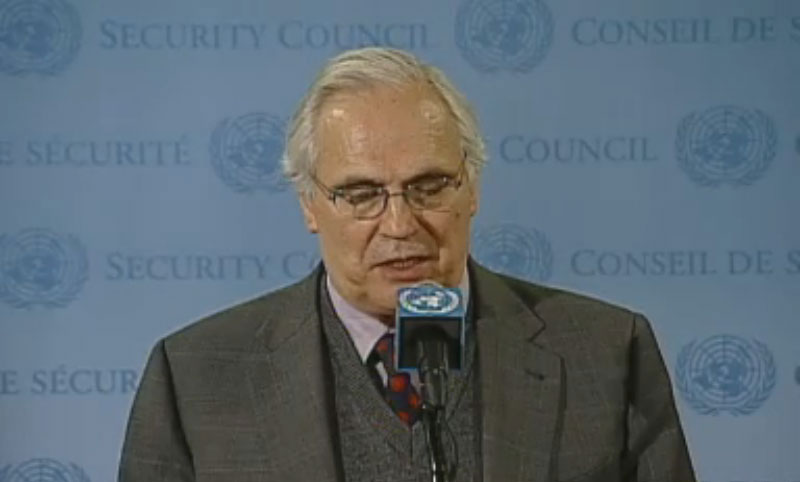FN:s fredsbevarande styrka i Västsahara Minurso är den enda som saknar MR-mandat, det vill säga rätt och skyldighet att övervaka och rapportera om eventuella brott mot de mänskliga rättigheterna.
Inte ens i nuläget föreslår generalsekreteraren att ett sådant mandat ska införas. Säkerhetsrådets sammanträder i oktober månad.
Det tidigare FN-sändebudet under åtta år, 2009-2017, den amerikanske diplomaten Christopher Ross, skrev på sin facebook 24 oktober att 10 senatorer uppmanat USA:s utrikesminister Blinken att ett MR-mandat ska införas i Minursos uppgifter. En journalist skrev då att detta inte var genomförbart. Det fick Christopher Ross att skriva en kommentar på Facebook. Han skrev bland annat:
”…Varför skulle mänskliga rättigheter (MR) vara omöjligt införa? Därför att Marocko skulle hitta på något sätt att blockera detta, precis som man gjorde år 2000 med Minursos förberedelser för en folkomröstning.
Och varför skulle Marocko vägra en folkomröstning? Därför att man fruktar att resultatet blir Självständighet.
Och varför skulle Marocko blockera ett MR-mandat för Minurso? Därför att ett sådant mandat skulle ge västsaharier i Västsahara, i opposition mot Marockos närvaro, en möjlighet att göra sina röster hörda, vilket Marocko gjort allt för att förhindra.”
Kommentarer som Christopher Ross fick på facebook är i princip otryckbara. Men han skriver i ett nytt inlägg dagen efter bland annat:
…”Mitt verkliga intresse är att lösningen ska ske som ett resultat av genuina förhandlingar mellan Marocko och Polisario, de två parter som varit involverade i denna konflikt sedan 1975, samt enligt på varandra följande resolutioner från säkerhetsrådet. Mitt intresse ligger i förhandlingsprocessens integritet, inte i dess resultat.
Nedan finns dock tre realiteter, som varje förhandling måste ta hänsyn till, om den verkligen ska vara genuin.
1 Västsahara är ett icke-självstyrande territorium separerat från Marocko, enligt Världsdomstolen, de högsta europeiska domstolarna, FN:s sekretariat och organ och de flesta länder runt om i världen. Tidigare president Trumps proklamation förändrar inte detta faktum.
2 En identifierbar befolkning av ′′västsaharier′′ med tydliga inhemska band till detta territorium existerar och ska inte förväxlas med andra etniska Sahrawis som har band till Marocko, Algeriet eller Mauretanien. Minurso:s identifiering av de som är röstberättigade i en folkomröstning var nästan klar år 2000, då Marocko drog sig ur processen. Denna lista skulle lätt kunna uppdateras med dödsfall och personer som nu nått rösträttsåldern.
3 Denna befolkning, varav en del är bosatta i Västsahara under marockansk administration och en del av dessa har tagit sin tillflykt till läger nära Tindouf, Algeriet, har en internationellt erkänd rätt att delta i att bestämma sin framtid genom någon form av självbestämmande (vanligtvis, men inte alltid, genom en folkomröstning). ”
Lena Thunberg
Från Christopher Ross facebook:
Ten Senators, Democrats and Republicans, recently wrote Secretary of State Blinken to urge that human rights monitoring be added to the mandate of the UN Mission for the Referendum in Western Sahara (MINURSO). PassBlue, an online journalism site, recently highlighted their letter, but also quoted a former head of MINURSO to the effect that taking this action would merely add “another un-implementable element” to its work. This prompted me to pen the following comment.
I served as the UN Secretary-General’s Personal Envoy for Western Sahara from 2009 to 2017. My mission, as defined by the Security Council, was to facilitate negotiations to achieve “a just, lasting, and mutually acceptable political solution, which will provide for the self-determination of the people of Western Sahara.” The proposals that Morocco and the Polisario had put forward in 2007 were mutually exclusive, and their rigidity ensured enduring stalemate at every face-to-face negotiating session I convened and in all the shuttle diplomacy I undertook in a quixotic search for flexibility.
In the absence of substantive progress on the future of Western Sahara, the issue of human rights became a substitute battle front, with each party accusing the other of serious human rights violations. To address these concerns, the Secretary-General’s reports to the Security Council have consistently called for sustained independent monitoring of human rights. The Polisario has been prepared to accept such monitoring, but, by Royal directive, Morocco has not.
In PassBlue’s article, Wolfgang Weisbrod-Weber, a former Special Representative of the Secretary-General in Western Sahara, addressed a hypothetical situation in which the Security Council added human rights to the mandate of the UN Mission for the Referendum in Western Sahara (MINURSO). He lamented that doing so would add yet another un-implementable element to MINURSO’s work. This does not tell the whole story. Why would adding human rights be un-implementable? Because Morocco would find a way to block it on the ground, as it did in 2000 with MINURSO’s preparations for a referendum. Why would Morocco refuse to have a referendum? Because if feared that the result would be independence. And why would Morocco block a human rights mandate? Because such a mandate would give resident Western Saharan opponents of the Moroccan presence a transparent way to inform the outside world of their views, which Morocco has done everything possible to prevent lest its claim to the territory be weakened.
This and other aspects of Morocco’s posture on the Western Sahara conflict make perfect sense in Rabat, but they make light not only of the recommendations of two successive UN Secretaries-General for human rights monitoring, but also of the Security Council’s repeated calls for negotiations without preconditions. Rabat has short-circuited these negotiations by trying to impose its autonomy proposal as the only item on the agenda to the exclusion of the Polisario’s proposal for a referendum. It has suffered no consequences for this comportment because France’s attachment to Moroccan stability impels it to prevent any serious effort to call Morocco to task for its failure to follow the guidance of the Security Council. Unless the Council takes corrective action, possibly by enlarging the mandate of the new Personal Envoy beyond simply convening meetings and engaging in shuttles in search of flexibility, he will face the same stalemated situation as his three predecessors.






